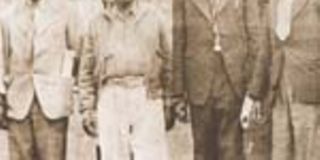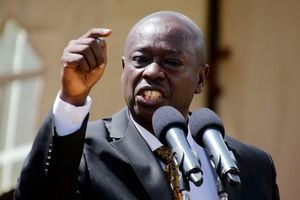Contrasting fortunes of the 'Kapenguria Six' nationalists

The freedom fighters dubbed the 'Kapenguria Six', who were tried by the British Colonial Government and jailed in the semi-arid north of the country for allegedly managing the Mau Mau revolt. They are from left, Paul Ngei, Fred Kubai, Jomo Kenyatta, Achieng Oneko, Kung'u Karumba and Bildad Kaggia.
Kenyans prepare to celebrate the 40th Kenyatta Day anniversary with only two of the original "Kapenguria Six" heroes of the freedom struggle who were jailed with founding President Mzee Jomo Kenyatta still alive.
Ramogi Achieng Oneko and Bildad Kaggia are the sole surviving members of the group of freedom fighters who were incarcerated by the colonialists in 1952 after the infamous trial in the semi-arid north of the country.
Mzee Kenyatta, who later served as the President until his death in 1978, former Cabinet minister Paul Ngei and trade unionist and for MP Fred Kubai have died, while businessman Kungu Karumba is presumed dead, after disappeared while on a trip to Uganda.
Although named Kenyatta Day in honour of the first President, there has been low-key agitation over the years to rename the day to better recognise all the freedom fighters rather just an individual.
The Sunday Nation sought the views of neighbours of the Kenyatta family in his Gatundu rural home on what the man, and the day, meant for them:
Eunice Wangui Githiri, 80, a farmer
During the Kenyatta era, life was relatively easy. In terms of development, he assisted us by constructing Kenyatta Road, which is still in very good condition. After the road was built, buses started coming to the area. Another good thing he did for our people was the construction of the Gatundu Hospital.
However, for all the good things he did for us, he failed in his role as our MP as he did not bring us water or electricity. It is only now, some 40 years after independence that individuals are installing electricity in their homesteads. We have taps but they do not produce any water.
When it comes to the issue of land, I cannot hesitate to say that Mzee Kenyatta was selfish. Apart from the road and hospital, there nothing much he did for the people here. However, life is much more difficult today. The other day I fell ill and when I went to Gatundu Hospital, the patients were told to buy syringes.
Mzee's son, Uhuru, now the MP for Gatundu South, is promising to bring development to the area. We have hope in him as our future national leader.
Rose Nyambura, 45, a small-scale trader
To tell the truth, one cannot believe that is an area that once was represented in Parliament by the President of this nation. Despite living directly opposite Mzee Kenyatta's home, there is nothing we can show for it. He did not bring us electricity, although we used to get water for free.
We only see the electricity lines taking power to his home and to Gatundu but we cannot afford to install electricity in our own homes.
The only people he assisted in from this area are the those he helped to join the Armed Forces, either as police officers or the military.
However, as a businessperson, life used to be good when he was alive as we could enter his home and sell foodstuffs to the various people who came to entertain Mzee almost every weekend.
Life today is much more difficult, as even the water we used to get for free during his time is no longer there. But there is hope in his son, Mr Uhuru Kenyatta, as he has already brought food aid to the people.
Mwangi wa Karanja, 56, a farmer
When Mzee Kenyatta was alive, our standard of living was high. He built a road and hospital and primary education was free.
As you can see this is a coffee growing area but people do not bother with it any more, as it brings no money to us.
During Mzee's time things were different and the proceeds from coffee were very high. Indeed, the last major coffee payment was paid to us during his time.
Mzee also made it possible for our people to buy and keep grade cattle, which had been denied Africans during colonial days.
Although we did not get water in our individual homesteads, Mzee at least made sure that there were community wells for families to draw water from, within easy reach.
You can only judge Mzee Kenyatta's performance when you take into consideration the colonial era. It is clear for everyone to see that he brought a lot of change to our people.
Peter Mwangi, 53, a businessman
Life under Mzee Kenyatta was perfect, the economy was strong. Then, unlike today, a very small amount of money could do a lot of things for you.
Many people claim Mzee Kenyatta did not bring electricity to the area, but they also must appreciate that he was a new president. Again, since he was the President of the whole republic, it would have been unfair for him to concentrate only on developing his home area.
Under Mzee Kenyatta's rule many landless people were assisted to acquire land outside this area through settlement schemes.
Mwangi adds: "As for his son, Uhuru, do not even mention it. I can never vote for him, as he is young person who does not appreciate the problems we face."
Stephen Mwaura, 35, a casual labourer
Although I was very young when Mzee Kenyatta was alive, what I can recall and from what I hear from elders is that life was much better.
Then, our people used to be treated free of charge at Gatundu Hospital, but that is no more. You have to pay much money and the doctors and nurses are normally very rude.
Although he did not bring electricity to people's homes, you cannot compare Mzee Kenyatta with former immediate President Daniel arap Moi. Mr Moi concentrated on developing his home area at the expense of others, something the founding President did not do.
Additional reporting by Joseph Ngunjiri




